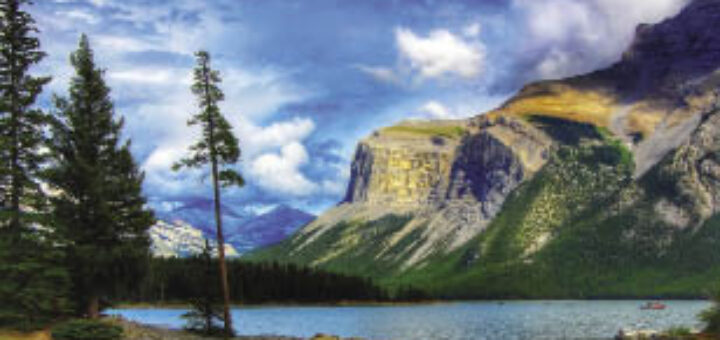MRU creates new park-centric research network, continuing work with federal partners

By Noel Harper, News Editor
Mount Royal University (MRU) is joining forces with the Government of Canada and the Canadian Parks Council to help preserve parks and other protected areas across the country, announced Parks Canada on this year’s World Science Day for Peace and Development.
The Pan-Canadian Parks and Protected Areas Research Network will bring together scientists, researchers, students, Indigenous knowledge holders and others to better understand Canada’s natural spaces.
MRU will contribute to the network through its Institute for Environmental Sustainability (IES), an academic facilitator that works with students across programs throughout the university on research related to sustainability. IES previously organized MRU’s World Wetlands Day symposium and helped sponsor an Indigenous studies field school in Hawaii, among other initiatives.
The Canadian Parks Council was established by the federal government to coordinate Canada’s many park agencies, on national and provincial levels alike. Over 2,700 parks across the country are represented by the council.
“Canadians are fortunate to have an abundance of nature right in our backyards — a gift that comes with a tremendous amount of responsibility to protect it,” read a release from the Parks Canada agency.
Over the next three years, $240,000 will be provided by the Government of Canada to aid in funding the network. Those involved with the project will work in an online capacity through elements such as remote courses, summits and webinars, giving network members the opportunity to share their knowledge and ideas towards managing protected areas.
Connie Van der Byl, Academic Director of IES, said in a statement that the network “aligns with our commitment to addressing complex and important issues through collaboration and with a multidisciplinary lens.”
“By bringing together those with an interest in parks and protected areas in Canada, the Pan-Canadian Parks and Protected Areas Research Network will have lasting impacts for the conservation of national parks and other protected areas in Canada, well into the future,” added Canada’s Environment and Climate Change Minister, Jonathan Wilkinson.
Facilitating the pan-Canadian network and its partner agencies will be MRU’s own Canadian Parks Collective for Innovation and Leadership (CPCIL), which began in 2018. CPCIL proves that MRU’s work to protect parks and nature did not begin with this new research project.
The collective previously brought IES and the Canadian Parks Council together in a partnership working to improve parks throughout Canada. MRU joined up with Victoria’s Royal Roads University, Toronto’s York University and the Université de Moncton to create the pan-Canadian group, bestowing its status onto Parks Canada’s new research network.
The proposal from MRU, Royal Roads and York was chosen by the Canadian Parks Council to create a support system for parks and protected areas, out of several submitted by over 40 universities throughout Canada.
The Pan-Canadian Parks and Protected Areas Research Network will fulfill one of four main goals established by CPCIL — a leaders and academics group related to parks and protected areas with the ability to pursue research opportunities and collaborations — in July 2018.
Other programs set out by CPCIL include an online forum and innovation hub to showcase the methodology and challenges of preserving Canada’s natural areas, and a resource database based on the knowledge of Canadian Parks Council members to share with others.
CPCIL aims to revolve around such learning opportunities as nature, leadership, Indigenous relationships and the inherent value to parks from both a social and business perspective.
Heading up CPCIL, and playing a key role in the Pan-Canadian Research Network, is Don Carruthers Den Hoed, a long-time provincial parks expert and former Alberta Parks manager for the East Kananaskis area.
“We are excited to grow this network by facilitating the meaningful participation of park leaders from government agencies, community groups, academic institutions, and Indigenous partners to share and apply multiple forms of knowledge to make evidence-based decisions,” said Carruthers Den Hoed in Parks Canada’s statement.
The idea of the research network was first born in October 2019 and officially launched on Nov. 10, 2020. According to CPCIL, the network will take advantage of crowdsourcing tools to find ideas and search relevant online profiles and connect with potential partners.
The network will be based in Calgary. Banff National Park and Jasper National Park are among the protected areas that will be researched as part of the project.
Protected areas include lakes and rivers, forests and wetlands and a variety of marine and fresh water-based habitats for many different species. Canada’s national, provincial, territorial and Indigenous parks are all considered protected areas.


